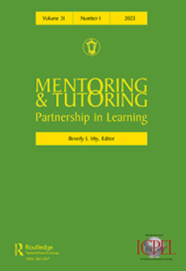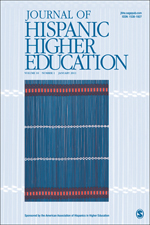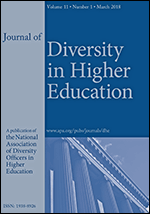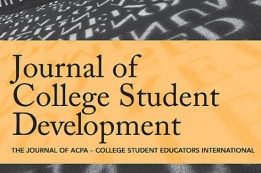“The Least I Could do is get that Four-Year Degree that they Sacrificed so much for”: Undocumented Latina/o families and the college navigation process.

Undocumented students face significant barriers in accessing postsecondary education. Previous research has focused on how individuals and schools impacted their experiences of enrolling in college. This critical qualitative study of testimonios with 15 undocumented Latina/o students examines how their families shaped and supported their college navigation process. Using a funds of knowledge framework, we find that parents and siblings shaped undocumented students’ college choices through dichos, or culturally situated advice. Once students attended college, many expressed a desire to give back to their parents and inspire other family members to pursue college. Students also articulated the utility of their degree as an avenue to give back to their local communities. We discuss the need for institutions to honor the collectivist orientation of Latina/o/x students and their families through recruitment and engagement efforts with these students.
Relationships as Embodied Counterspaces in the Academy
 This study explores the experiences of 24 Black, Indigenous, and People of Color (BIPOC) students and four staff members affiliated with a transitional undergraduate research program that facilitated a bi-directional socialization process that nurtured students’ cultural backgrounds and identities. This critical qualitative case study considers the possibility of relationships as embodied counterspaces in the academy, encouraging us to reconsider the ways in which we imagine spaces of restoration and empowerment in higher education. Findings reveal that counterspaces can transcend physical spaces and can become embodied within relationships that move with, and can be accessed by, students throughout their college journey. Within these relationships, students are affirmed and empowered, which supports them in navigating college. Implications for research and practice are provided.
This study explores the experiences of 24 Black, Indigenous, and People of Color (BIPOC) students and four staff members affiliated with a transitional undergraduate research program that facilitated a bi-directional socialization process that nurtured students’ cultural backgrounds and identities. This critical qualitative case study considers the possibility of relationships as embodied counterspaces in the academy, encouraging us to reconsider the ways in which we imagine spaces of restoration and empowerment in higher education. Findings reveal that counterspaces can transcend physical spaces and can become embodied within relationships that move with, and can be accessed by, students throughout their college journey. Within these relationships, students are affirmed and empowered, which supports them in navigating college. Implications for research and practice are provided.
Developing a Culture of Mentoring: Promoting, Experiencing, and Engaging in Mentoring Through a Transitional Undergraduate Research Program for Students of Color.
 In this critical qualitative study, we examined how mentoring in a college bridge program for first-year students from historically marginalized backgrounds contributed to the development of a culture of mentoring. Participants included 24 students who participated in Project Scholar, and four staff members who worked for the program. We utilized Yosso’s (2005) Community Cultural Wealth theory as a theoretical framework to analyze students’ experiences. Initial findings revealed that participation in Project Scholar and mentoring in the program contributed to a culture of mentoring both within the program and among the broader Community of Color on campus. Community cultural wealth among students, staff, and alumni of Project Scholar was instrumental in promoting a culture of mentoring in the program and among the Community of Color on campus. We conclude by discussing implications for research and practice and providing a novel conceptual model for creating a culture of mentoring.
In this critical qualitative study, we examined how mentoring in a college bridge program for first-year students from historically marginalized backgrounds contributed to the development of a culture of mentoring. Participants included 24 students who participated in Project Scholar, and four staff members who worked for the program. We utilized Yosso’s (2005) Community Cultural Wealth theory as a theoretical framework to analyze students’ experiences. Initial findings revealed that participation in Project Scholar and mentoring in the program contributed to a culture of mentoring both within the program and among the broader Community of Color on campus. Community cultural wealth among students, staff, and alumni of Project Scholar was instrumental in promoting a culture of mentoring in the program and among the Community of Color on campus. We conclude by discussing implications for research and practice and providing a novel conceptual model for creating a culture of mentoring.
Letters to My Sisters: Advice From Black Women Alumnae About How to Thrive and Survive in College
 This article presents advice that Black women college alumnae offered for Black women to be successful in college. Using an innovative letter-writing approach that is rooted in Black feminist theory, findings maintain the necessity of nuance and multifaceted approaches to advice for Black women, emphasizing the need for self-discovery, individually identified ideas of success, and unconditional love for oneself and other Black women.
This article presents advice that Black women college alumnae offered for Black women to be successful in college. Using an innovative letter-writing approach that is rooted in Black feminist theory, findings maintain the necessity of nuance and multifaceted approaches to advice for Black women, emphasizing the need for self-discovery, individually identified ideas of success, and unconditional love for oneself and other Black women.
Supportive or Exclusive: Institutional Agents and Undocumented Latina/o College Students in the Midwest
 This critical qualitative study of testimonios with undocumented Latina/o students in the Midwest explored how institutional agents impacted the level of difficulty students experienced in navigating their collegiate environments. We used social capital theory and Latino critical race theory as our analytic frameworks and employed a critical race methodology to examine and deconstruct students’ interactions with institutional agents. Two types of institutional agents emerged in the data: (a) unapologetically uneducated stakeholders who were not knowledgeable of ways to support undocumented or DACAmented students (and often resisted seeking out this knowledge) and (b) supportive and knowledgeable stakeholders who often independently sought out ways to assist undocumented students within institutional contexts that were often unprepared to support them systematically. Findings revealed students often encountered institutional agents who knew very little about relevant resources and policies, leading many students to feel as if they needed to educate staff and faculty.
This critical qualitative study of testimonios with undocumented Latina/o students in the Midwest explored how institutional agents impacted the level of difficulty students experienced in navigating their collegiate environments. We used social capital theory and Latino critical race theory as our analytic frameworks and employed a critical race methodology to examine and deconstruct students’ interactions with institutional agents. Two types of institutional agents emerged in the data: (a) unapologetically uneducated stakeholders who were not knowledgeable of ways to support undocumented or DACAmented students (and often resisted seeking out this knowledge) and (b) supportive and knowledgeable stakeholders who often independently sought out ways to assist undocumented students within institutional contexts that were often unprepared to support them systematically. Findings revealed students often encountered institutional agents who knew very little about relevant resources and policies, leading many students to feel as if they needed to educate staff and faculty.
Lifting While We Climb: Undergraduate Students of Color Communal Uplift and Promotion of College-Going within Their Communities
 This critical qualitative study examines the ways first-generation Students of Color (Latina/o/x, African American, Native American, and biracial) at two predominantly White institutions in the Midwest activate their college knowledge, or cultural capital, to assist youth from their communities in viewing higher education as a viable option. In sharing cultural capital, participants are actively attempting to influence the habitus of youth of Color. By encouraging the pursuit of higher education, participants in this study were engaging in communal uplift. Findings reveal the need for colleges and universities to acknowledge, validate and support underrepresented students in their communal uplift efforts.
This critical qualitative study examines the ways first-generation Students of Color (Latina/o/x, African American, Native American, and biracial) at two predominantly White institutions in the Midwest activate their college knowledge, or cultural capital, to assist youth from their communities in viewing higher education as a viable option. In sharing cultural capital, participants are actively attempting to influence the habitus of youth of Color. By encouraging the pursuit of higher education, participants in this study were engaging in communal uplift. Findings reveal the need for colleges and universities to acknowledge, validate and support underrepresented students in their communal uplift efforts.
Developing a College-Going Habitus: How First-Generation Latina/o/x Students Bi-directionally Exchange Familial Funds of Knowledge and Capital
within Their Familias
This qualitative study analyzes interviews with 17 first-generation Latina/o/x students.  This study bridges funds of knowledge and social reproduction theory to examine the bi-directional exchange of familial funds of knowledge and capital relevant to higher education in Latina/o/x families. Students’ familial funds of knowledge assisted them as they accessed and persisted through higher education. Students bridged fields between their home communities and higher education when they shared capital and transformed it into funds of knowledge to assist family members in accessing college. In doing so, students encouraged the pursuit of higher education, contributing to the college-bound habitus of their familias. Implications for practice center on cultural shifts that must occur at the institutional level to develop policies and practices around developing relationships and partnerships early on with Latina/o/x communities.
This study bridges funds of knowledge and social reproduction theory to examine the bi-directional exchange of familial funds of knowledge and capital relevant to higher education in Latina/o/x families. Students’ familial funds of knowledge assisted them as they accessed and persisted through higher education. Students bridged fields between their home communities and higher education when they shared capital and transformed it into funds of knowledge to assist family members in accessing college. In doing so, students encouraged the pursuit of higher education, contributing to the college-bound habitus of their familias. Implications for practice center on cultural shifts that must occur at the institutional level to develop policies and practices around developing relationships and partnerships early on with Latina/o/x communities.
Connecting Identity with Research: Socializing Students of Color Towards Seeing Themselves as Scholars

Through analysis of student interviews and program staff interviews, this project explores how one program was crafted to help Students of Color develop competencies for educational success, gain exposure to undergraduate research, and maintain their cultural identities as part of their scholarly pursuits. Findings revealed that intentional bi-directional socialization processes that incorporated students’ backgrounds into their academic pursuits positively contributed to students’ development as scholars. The bi-directional socialization process that was facilitated by the program’s intentional programming and interactions created academic counterspaces that promoted the development of relationships with peers, staff, and faculty who helped guide students’ educational pursuits.
Transformational Mentoring Practices: Students’ Perspectives on Practitioner-Educators’ Support During College
This critical, multisite case study explored Students’ of Color in STEM disciplines perspectives on the positive mentoring practices of practitioner-educators. Grounded in a critical approach to Bourdieu’s social reproduction theory, the findings emphasize the importance of practitioner-educators in supporting students and offer recommendations for positive mentoring practices.
Authentically me: Examining expectations that are placed upon Black women in college.
Through analyzing critical life stories with Black alumnae from predominantly White institutions, this article offers a narrative, in-depth approach to explore the ways in which alumnae managed and resisted expectations and stereotypes that were placed upon them by peers, faculty, and staff during college. Findings suggested that participants grappled with assumptions of who they should be as Black college women. As they resisted stereotypes and expectations, they crafted unique pathways toward asserting their authentic selves. The findings emphasize heterogeneity among Black women and the need for varied support structures in educational institutions.
“Es como una Familia”: Bridging emotional support with academic and professional development through the acquisition of capital in Latinx student organizations
This study explores the ways Latinx-based organizations assist  students in navigating college and career preparation. Data consist of in-depth interviews with 17 first-generation Latinx students attending two predominantly White institutions in the Midwest. I employed Bourdieu’s social reproduction theory to examine the ways Latinx student organizations cultivate social and cultural capital among participants. Findings reveal that peers in Latinx-based organizations share capital relevant to navigating college, academics, and career development.
students in navigating college and career preparation. Data consist of in-depth interviews with 17 first-generation Latinx students attending two predominantly White institutions in the Midwest. I employed Bourdieu’s social reproduction theory to examine the ways Latinx student organizations cultivate social and cultural capital among participants. Findings reveal that peers in Latinx-based organizations share capital relevant to navigating college, academics, and career development.
Person First, Student Second: Staff and Administrators of Color Supporting Students of Color Authentically in Higher Education
 In this qualitative study I explored the mentoring roles of staff and administrators for first-generation Black, Latinx, and Biracial students. Social reproduction theory (which assesses how inequality is perpetuated or disrupted generationally) was used to analyze social capital cultivated by mentors. Staff of Color nurtured the capital that students brought with them to college, and because of this students often turned to the staff for other forms of support, which opened the door for acquisition of cultural capital. White staff focused almost exclusively on students’ academic experiences, neglecting their backgrounds. Supporting students holistically and valuing their backgrounds establish authentic relationships that support students’ success.
In this qualitative study I explored the mentoring roles of staff and administrators for first-generation Black, Latinx, and Biracial students. Social reproduction theory (which assesses how inequality is perpetuated or disrupted generationally) was used to analyze social capital cultivated by mentors. Staff of Color nurtured the capital that students brought with them to college, and because of this students often turned to the staff for other forms of support, which opened the door for acquisition of cultural capital. White staff focused almost exclusively on students’ academic experiences, neglecting their backgrounds. Supporting students holistically and valuing their backgrounds establish authentic relationships that support students’ success.
Colorblind mentoring? Exploring white faculty mentoring of Students of Color.
 In this critical multisite case study we examined the concept of colorblind mentoring. Using Bonilla-Silva’s Colorblind Racism Frames, we sought to understand White faculty members’ perspectives on their mentoring of Students of Color. The findings revealed that White faculty members often engage with students from a “colorblind perspective.” Their use of race-neutral, colorblind language (avoiding racial terms but implying them) allowed White faculty members to describe their students as academically inferior, less prepared, and less interested in pursuing research and graduate studies while potentially ignoring structural causes. Faculty perceptions of students may influence the way Students of Color perceive their academic abilities and potential to achieve success in STEM disciplines and in graduate education.
In this critical multisite case study we examined the concept of colorblind mentoring. Using Bonilla-Silva’s Colorblind Racism Frames, we sought to understand White faculty members’ perspectives on their mentoring of Students of Color. The findings revealed that White faculty members often engage with students from a “colorblind perspective.” Their use of race-neutral, colorblind language (avoiding racial terms but implying them) allowed White faculty members to describe their students as academically inferior, less prepared, and less interested in pursuing research and graduate studies while potentially ignoring structural causes. Faculty perceptions of students may influence the way Students of Color perceive their academic abilities and potential to achieve success in STEM disciplines and in graduate education.
Students perspectives on holistic mentoring practices in STEM fields.
 This critical multi-site case study examined the holistic mentoring practices provided by faculty to Students of Color in STEM fields at a predominantly White institution and a historically Black institution. We employed Bourdieu’s social reproduction theory to examine the ways in which social capital developed through faculty-student mentoring relationships led to the accumulation of cultural capital valued in STEM fields and higher education more broadly.
This critical multi-site case study examined the holistic mentoring practices provided by faculty to Students of Color in STEM fields at a predominantly White institution and a historically Black institution. We employed Bourdieu’s social reproduction theory to examine the ways in which social capital developed through faculty-student mentoring relationships led to the accumulation of cultural capital valued in STEM fields and higher education more broadly.
Encouraged or “weeded out” in the STEM disciplines: Students’ perspectives on faculty interactions within a predominantly White and a historically Black institution.
 For this multisite qualitative case study, framed in Bourdieu’s social reproduction theory, we examined mentoring experiences among Students of Color majoring in science, technology, engineering and mathematics (STEM) disciplines at both a predominantly White institution and a historically Black institution. Findings revealed that faculty served as gatekeepers for accessing STEM-related careers for Students of Color. Students of Color at the historically Black college experienced positive mentoring and professional development, whereas those at the predominantly White institution found the faculty unwilling to mentor them professionally and perceived the faculty as “weeding them out” of the STEM field.
For this multisite qualitative case study, framed in Bourdieu’s social reproduction theory, we examined mentoring experiences among Students of Color majoring in science, technology, engineering and mathematics (STEM) disciplines at both a predominantly White institution and a historically Black institution. Findings revealed that faculty served as gatekeepers for accessing STEM-related careers for Students of Color. Students of Color at the historically Black college experienced positive mentoring and professional development, whereas those at the predominantly White institution found the faculty unwilling to mentor them professionally and perceived the faculty as “weeding them out” of the STEM field.
Instrumental or Meaningful Friendships: Black Alumnae Perspectives on Peer Relationships During College

This critical qualitative study explores how Black women experienced friendships throughout college. Findings revealed that long-term friendships, primarily with other Students of Color, were both created and maintained, were meaningful in nature, and often spanned several contexts. Women also described short-term instrumental friendships, often with diverse others. Instrumental relationships were designed to meet a particular need and were often context-bound. The analysis ends with implications for students’ relationships in and outside of their racial/ethnic group and with practical implications for administrators on college campuses.


